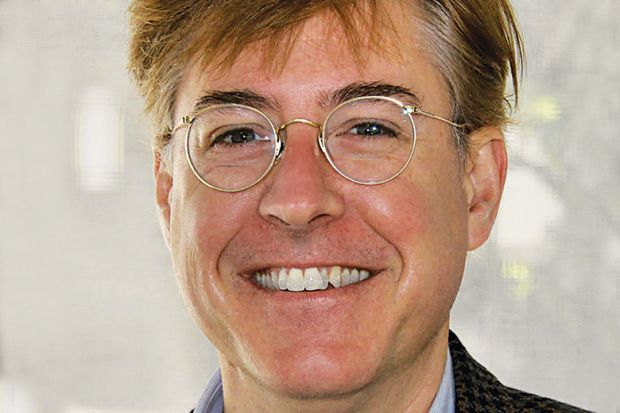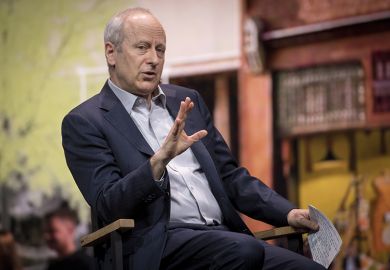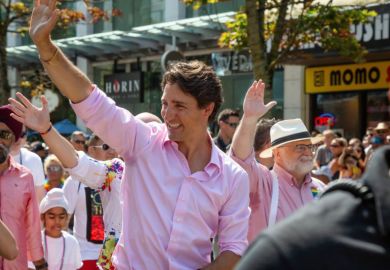There’s sardonic laughter from Thomas Frank at mention of the allegations that Donald Trump cheated in the entrance exam for the University of Pennsylvania, the Ivy League institution that the US president endlessly boasts of having attended.
“As though that matters – it’s all dishonest,” he says.
“I just think that’s hilarious, that way of attacking him. It’s extraordinary to me, the things that matter to the highly educated liberal class: ‘He didn’t get into an Ivy League university fairly.’ Who does?”
To be admitted to an Ivy League university, Frank adds, is to be “admitted to this elite class that gets to harvest the product of everybody else’s labour. What difference does it make whether you got into that class fairly or unfairly? The basic operation of that class is profoundly unfair.”
A former Wall Street Journal and Harper’s columnist who left the academy after a PhD in history, Frank is now a prominent commentator on US politics, speaking from a disaffected left flank at a distant remove from the Democratic establishment. Higher education, particularly elite higher education and the politics of rule by the “well-graduated”, has often been central to his analysis.
Frank made his name with What’s the Matter with Kansas?: how conservatives won the heart of America (2004), which looked (through the lens of his home state) at how the Republicans built an election-winning machine in blue-collar America using manufactured culture wars. In Listen, Liberal: or, what ever happened to the party of the people? (2016), he presented the Democrats as having abandoned the working class by opting to shift their allegiance towards the college-educated professional class. Some of the essays collected in Rendezvous with Oblivion (2018) explore “the rot and the corruption” of American universities, critiquing a higher education “industry” that “sells tickets to the affluent life” while neglecting scholarship.
In his new book, People without Power: the war on populism and the fight for democracy (published in the US as The People, No: a brief history of anti-populism), Frank attempts to reclaim populism for the left by attacking what he regards as its misrepresentation by academic theorists. He also laments the “meritocracy” he sees presented as populism’s “diametric opposite”: “rule by well-graduated people who have dutifully climbed every ladder, rung every bell, and been rewarded for their excellence with their present high stations”.
Following the Brexit vote and Donald Trump's election in 2016, a slew of books have spotlighted the political divide between graduates and non-graduates, along with the iniquities and inequalities bred by the educational meritocracy that is now the driving principle of many Western societies.
Frank, who has been mining that seam for longer than most, offers answers to the most fundamental question: why is education now at the centre of our politics?
His latest book starts by taking readers back to a train ride between Kansas City, Missouri and Topeka, Kansas one day in May 1891, when the term “populism” was invented. The originators of the term were the “angry farmers” of the People’s Party, who, after upending the political system in Kansas, were challenging the US’ two-party system by taking their party national, with its radical challenge to “poverty, unbearable debt, monopoly and corruption”.
The People’s Party was swiftly crushed by conservative business interests. But its afterlife is still felt today.
People without Power looks at “how the critique of populism, which you see everywhere nowadays – this misunderstanding of populism as a movement of ignoramuses and racists and bigots and authoritarians – is bound up with the professional class’ understanding of itself and its own brilliance and its own virtues,” explains Frank. “The misunderstanding came out of higher education.”
The People’s Party movement took an unjust hammering, Frank argues, in the 1950s and 1960s in the work of Richard Hofstadter, a Columbia University history professor and prominent public intellectual, who analysed the 1890s populists in The Age of Reform (1955). His work portrayed them as “enemies of higher learning”, among other things, says Frank – and, on the basis of this critique, a strand of academic anti-populism developed that caricatured populism as the inverse of everything cherished by the learned and enlightened.
This academic anti-populism has flourished once again in the era of Brexit and Trump. Even though this misunderstanding of populism is “based on [Hofstadter’s] famous scholarly mistake”, according to Frank, it has become a “pet idea of academics – they won’t let it go. Today there’s a whole discipline: global populism studies.”
The leading modern scholars of populism get rough treatment in Frank’s book. Jan-Werner Müller, professor of politics at Princeton University, has argued in What is Populism? (2016) that “the one party in US history that explicitly called itself ‘populist’ was in fact not populist”. What he means by this, suggests Frank, is that “the people who invented the word were not the racist, authoritarian demagogues that Müller wishes to associate with the word”.
The final section of People without Power turns to what Frank characterises as the Democrats’ decision, from the 1970s onwards, to become “anti-populists”, who “wanted no part of any systematic critique of big business or monopoly or the financial industry” and “shied away from building or supporting mass movements”; a decision to be not “the voice of working-class people”, but “a sort of coming together of the learned and the virtuous”.
The key divide in the 2016 US presidential election was the support of non-graduates for Trump, and of graduates for Hillary Clinton, many political commentators have observed. So how did that happen?
“Part of it is the Democratic party chose that in the late ’60s and early ’70s,” answers Frank. In the wake of the Vietnam War, which was supported by many union leaders, it “decided it didn’t want to be the party of organised labour any more”. Instead, it “basically decided that the people it wanted to reach out to were the enlightened kids on college campuses”, particularly those on elite campuses, such as those of the big public universities and the Ivy League.
In more recent times, People without Power singles out the influence of theories about the “Learning Class” articulated in 1998 by William Galston, the former University of Texas, Austin political science professor and Clinton administration official. “The New Economy favors a rising Learning Class over a declining working class,” Galston wrote in a pamphlet he co-authored for the centrist Democratic Leadership Council, urging the party to complete the transformation of its electoral focus.
Accompanying this shift in the party’s electoral base has been a near-complete capture of the Democratic leadership by an Ivy League-educated elite. Bill Clinton and Barack Obama were both “plucked from obscurity by prestigious universities”, Frank writes in Listen, Liberal. It is not surprising that “both of them eventually signed on to a social theory in which higher education is the route to individual success and to national salvation as well”, and in which there is no social or political problem that cannot be remedied with more education and training, he argues.
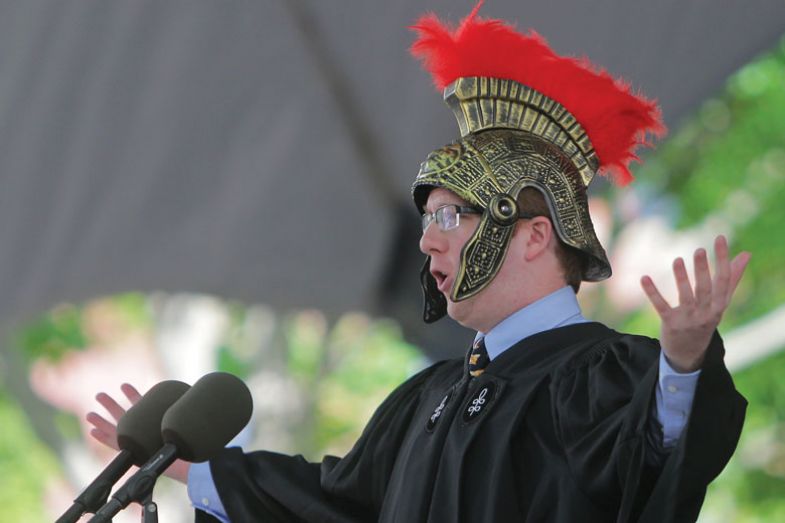
Frank quotes with distaste the meritocratic views of Democratic establishment figures.
In 2009, for example, when former US Treasury secretary and Harvard University president Larry Summers was leading Obama’s team of economic advisers, he declared: “One of the reasons that inequality has probably gone up in our society is that people are being treated closer to the way they’re supposed to be treated.”
This kind of view, Frank argues, is a “moral judgement” handed down by a successful professional class that defines itself by its educational achievement. And “every time they tell the country that what it needs is more schooling, they are saying: inequality is not a failure of the system; it is a failure of you”, he writes.
As the Democrats shifted from organised labour to the “Learning Class”, the party’s priorities in government also shifted. Frank believes that independent charter schools, “zero tolerance” of crime and support for the North American Free Trade Agreement (Nafta) were all policies designed for the college-educated professional class (with working-class anger at Nafta seen by many as central to Trump’s election-deciding wins in the deindustrialised Midwest).
Another issue is the Democrats’ endless indulgence of Wall Street, where Frank identifies Ivy League “class solidarity” at the root of Obama’s failure to regulate or prosecute in the wake of the financial crash: “[Obama and his cabinet] wouldn’t send the FBI to investigate these bankers who they either knew personally or went to the same institution [with].”
Listen, Liberal identified two elites: the “hierarchy of money” and the “hierarchy of learning”. “But, increasingly, the hierarchy of learning is eclipsing the other one,” Frank says. And that hierarchy “justifies itself in a way that is absolutely and utterly convincing to themselves. They are on top because they are the best, because they are most able, because they are the smartest, because they got the best grades.”
But is the rise of a college-educated professional class the flip side of deindustrialisation: just an organic phase of social development?
“Deindustrialisation is not something that just happens,” replies Frank. “The destruction of organised labour – that’s not natural, that’s something that happened because of policies.”
Until the 1970s it was “normal – at least in the northern [US] states” to be “a blue-collar worker and have a middle-class standard of living”. However, the dominant view today asks: “How could [blue-collar non-graduates] possibly be entitled to a middle-class standard of living?” Yet in countries such as Germany and Japan, Frank points out, it is still “totally possible for people without college degrees to lead a middle-class life”.
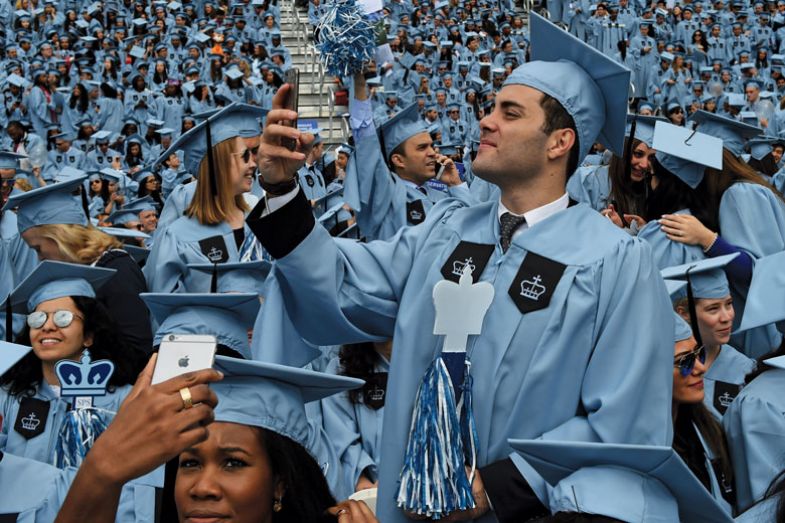
But what about the impact of university education in Frank’s own life?
He studied at the public University of Kansas and University of Virginia, before completing his history PhD at the private University of Chicago. Yet seeing his generation of doctoral graduates going on to become “adjuncts and very low-paid teachers” deterred him from continuing in academia. And he has watched from afar as “the university system in the last 20 years has transformed itself to become so top-heavy with administrators” and “very, very expensive to attend” even as the value of its “product” – learning and scholarship – “has fallen and fallen and fallen”.
“It’s funny that these things happened at the same time: the destruction of a generation of would-be intellectuals and the generalised worship of educational attainment as an element of social status,” Frank reflects. “That’s the toxic irony I’m going to take to my grave.”
As ironies go, Trump's 2016 election win was also considerable. An Ivy League billionaire who bought the steel for his skyscrapers from China and flew into the deindustrialised Midwest on his private jet and successfully passed himself off as a populist, finding a way to connect with non-graduates (or “the poorly educated”, as he calls them) by attacking the Democrats for having abandoned American manufacturing and workers.
Trump's success offers lessons for other parties of the left and centre across the West. Even if he loses November’s election, says Frank, “there’s going to be another one after him – another person with the same act”.
Still, Frank is not hopeful that the recent clutch of books by US writers attacking the idea of educational meritocracy offers any prospects for change, arguing that the public already understands the injustices around higher education but elite universities are so wealthy and powerful that they can resist any calls for reform.
The only hopes for the future he sees are in broader political change. He writes, in People without Power, that “populism wins” as the “classic, all-American response to hierarchy and plutocracy”, and that a modern-day populism would follow the model set by Bernie Sanders’ unsuccessful campaign for the Democratic presidential nomination in 2016. It would bring together a “mass movement of working people” in support of “universal healthcare, no more grotesque student debt, banking reform, a war on monopolies, a reimagining of our trade policy.
“The great populist moments in American life – the 1890s, the 1930s, the 1960s – had these mass movements of ordinary people behind them,” Frank says. “It’s hard to see what that movement is right now. Maybe Black Lives Matter will become such a movement. It isn’t there yet, but it might become something like that.”
Without such a new political force, the Democrats will still be what Frank describes as “this very smug party of the highly educated looking down on the ‘unenlightened’ and saying: ‘Of course I’m more successful than you and I have a decent life and I have a beautiful home in the suburbs – I’m a virtuous person, I’m smart, I studied hard and I got what I deserved’.”
The Republicans, meanwhile, will remain “a bunch of demagogues who will say anything and then go out and do favours for their rich supporters, their rich friends...My money would be on that dynamic continuing.”
Thomas Frank’s People without Power: the war on populism and the fight for democracy was recently published by Scribe UK. The US edition was published under the title The People, No: a brief history of anti-populism by Metropolitan Books.
Register to continue
Why register?
- Registration is free and only takes a moment
- Once registered, you can read 3 articles a month
- Sign up for our newsletter
Subscribe
Or subscribe for unlimited access to:
- Unlimited access to news, views, insights & reviews
- Digital editions
- Digital access to THE’s university and college rankings analysis
Already registered or a current subscriber? Login
